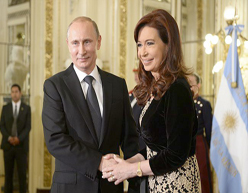Resounding successes of Putin’s foreign tours show futility of US’ anti-Russia sanctions policy and isolation rhetoric

Just after a few weeks of the triumphant China tour that yielded the world’s largest energy deal, a USD 400bn gas supply project, between Moscow and Beijing, Russian President Vladimir Putin is back again on transcontinental international business trips.
The 30-year gas deal was penned Putin and Chinese President Xi Jinping during the Shanghai Summit against a background of the largest joint naval exercise between the two region's formidable defense ministries. Chinese state-owned media Xinhua referred to the historic deal as "an important result of strengthening Sino-Russian relations as comprehensive energy partners", while, Global Times hinted at much broader motivations, saying the "deal showed that
Putin's Latam tour
This time, Putin's destinations include several countries in Latin America (Latam), a region traditionally seen as
The full-scale high-level grandiose receptions for Putin in
Quite the contrary,
Nicaraguan President Daniel Ortega surmised for the rest global community seeking an alternative world order to the current unipolar, do-it-my-way-or-be-dammed doctrine, epitomized by the
“You are the ray (of light), a lightning in global politics,” Ortega told the Russian leader who was briefly in the country after the Nicaraguan leader specially requested him to make an unplanned stopover in his country.
Argentine President Cristina Fernandez de Kirchner denounced West’s so-called traditional “double standard” approach to global policies. “Our position is that countries don’t need to have double standards so that we can arrive at solutions that just, legal and based on international law. In this context, there are should not be different types of international law. There is only one international law," De Kirchner noted. Putin said Russia highly values Argentina's independent sovereign views on global issues, a rarity among several global leaders, a subtle reference to countries that blindly toe US line even on issues that run counter to their national interests.
Growing dissatisfaction with
These statements from the Latam regional leaders – a reflection of rest of the global community’s growing dissatisfaction with
Indeed, the rest of the global community is increasingly becoming fed up with the stances of Washington and its allies, who always think that their views and opinions on international geopolitical affairs should be respected with the same unquestionable belief and sanctity as those reserved for the Roman Catholic’s papal infallibility on religious teachings.
The vocally dissenting voices have transcended politics, spreading into business sectors. The most recent evidence is the t election of Igor Sechin, the president of Russian oil giant, Rosneft, blacklisted by the
The feat became possible following Rosneft’s acquisition of a 50% stake in Camfin, an investment corporate entity that controls a 26.2% of Pirelli, from a consortium of leading Italian financial corporations, Unicredit, Intesa and Clessidra, according to the Russian energy giant’s official statement.
A similar EU’s anti-Russian sanction list does not include Sechin, a leeway that enabled Pirelli to admit the Russian business executive to its board and the Italian corporations to enter into a deal with a company under his management.
EU businesses defy US' anti-Russia sanctions
The
These corporations have called the
This is the reality that the
They will need to weigh the political, economic and social costs of such alliances to their electorates before pledging their allegiances. To Obama and his administration, these allies will justifiably say in their collective defense, this is nothing political or personal, but just pure business. And they will be completely right.












 Web design,
Web design,